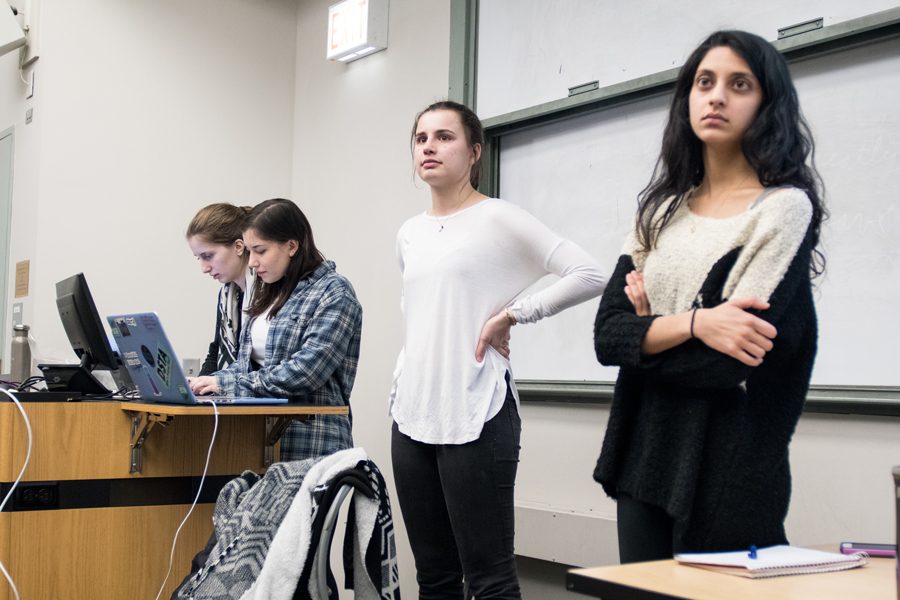Students discuss revisions to University sexual misconduct policy
Colin Boyle/Daily Senior Staffer
Gabrielle Bienasz and Nehaarika Mulukutla facilitate a town hall Wednesday. Attendees discussed revisions to the University’s sexual misconduct policy.
February 1, 2018
Associated Student Government and Sexual Health and Assault Peer Educators hosted a town hall Wednesday to solicit student feedback on revisions made to Northwestern’s sexual misconduct policy.
Attendees discussed the new policy’s standards and definitions to help ASG better gauge the student body’s perspectives before submitting an official proposal of recommendations to the administration, ASG President Nehaarika Mulukutla said.
Facilitators introduced the policy’s guidelines surrounding consent, which prompted requests for clarification regarding who “initiates” sexual activity. Students expressed an overall unfamiliarity with the definition and complexities of language used to describe consent, in both the old and new policies.
“It was really important to understand: What is consent, and how do you acquire it, and how do you know it’s not present?” Mulukutla, a Weinberg senior, said. “That is the underpinning of the entire situation surrounding rape culture and surrounding sexual assault culture.”
Additionally, specific words used to describe consent were analyzed. Students particularly called attention to words such as “voluntary,” “coercion” and “active,” and discussed the potential that power dynamics in relationships can subvert expectations of consent.
Attendees also discussed the policy’s “Prohibited Conduct” section, the definition of sexual harassment and the definition of a hostile environment: one which “exists when the conduct is sufficiently severe, persistent or pervasive.”
The conditions of “severe, persistent and pervasive” can set an expectation for individuals to have to prove the extent of their suffering, said Gabrielle Bienasz, ASG senator for SHAPE.
“We don’t want people … who reported Title IX to have to go through this enormous process to prove an enormous amount of distress,” Bienasz, a Medill sophomore, said. “That will discourage people from reporting. It will make it harder for people who are actually doing those things to be punished by the University.”
Mulukutla highlighted attendees’ suggestions that the policy be more oriented toward survivor support, considering Illinois law. For example, the standard of proof used by the University may be subject to change as new national standards are considered, which students said may discourage survivors from coming forward.
The new policy will also incorporate the University’s new policy regarding retaliation, which may make it more difficult for student organizations to expel members based on sexual misconduct, or so-called “vigilante justice,” especially in cases when survivors do not report the misconduct to the Title IX Office.
“Do we have the right and can we remove people from our groups that make someone uncomfortable?” Bienasz told The Daily. “The University says no, but I think most of the student body would say that they want to be able to do that.”
Dwight Hamilton, the associate vice president for equity and Title IX coordinator, told The Daily that the conversation allowed administrators in attendance to better understand the students’ views before the new policy goes into effect. He explained policy specifications and provided insight into how his office has conducted investigations in the past.
“One uniform position, regardless of the opinions that people expressed, was a desire to ensure that Northwestern is free from sexual violence,” he said. “I heard a lot of great conversations, and there’s a lot of really, really good things that it’s provoked in my mind in thinking about the process. We welcome that input.”
Email: [email protected]
Twitter: @rachkupfer


